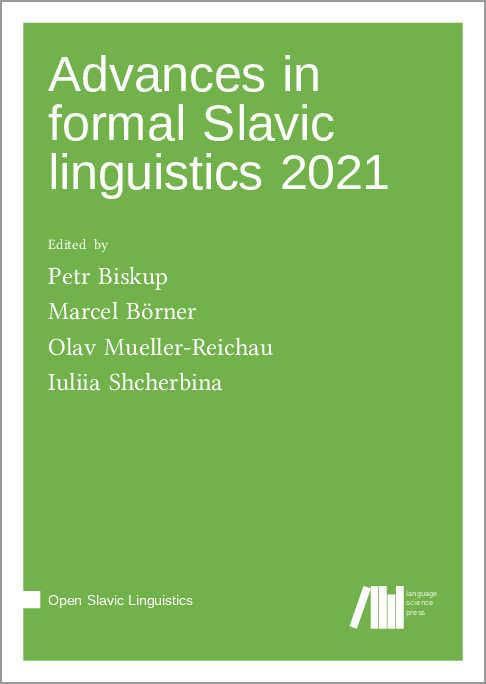We log anonymous usage statistics. Please read the privacy information for details.
Advances in formal Slavic linguistics 2021
Synopsis
Advances in formal Slavic linguistics 2021 offers a selection of articles that were prepared on the basis of talks given at the conference Formal Description of Slavic Languages 14 or at the satellite workshop on secondary imperfectives in Slavic, which were held on June 2–5, 2021, at the University of Leipzig. The volume covers all branches of Slavic languages and features synchronic as well as diachronic analyses. It comprises a wide array of topics, such as degree achievements, clitic climbing in Czech and Polish, typology of Slavic l-participles, aspectual markers in Russian and Czech, doubling in South Slavic relative clauses, congruence and case-agreement in close apposition in Russian, cataphora in Slovenian, Russian and Polish participles, prefixation and telicity in Serbo-Croatian, Bulgarian adjectives, negative questions in Russian and German and imperfectivity in discourse. The numerous topics addressed demonstrate the importance of Slavic data and the analyses presented in this collection make a significant contribution to Slavic linguistics as well as to linguistics in general.
Chapters
-
Specification of telicity in Serbo-Croatian, without null prefixes
-
Doubling in South Slavic relative clauses and the predictability of morphosyntactic features
-
Aspect separated from aspectual markers in Russian and Czech
-
Degree achievements from a Slavic perspective
-
“True” imperfectivity in discourse
-
Responding to negative biased questions in Russian
-
Inflectionless adjectives in Bulgarian as a case of nominal predication
-
Clitic climbing without restructuring in Czech and Polish
-
Phi-congruence and case agreement in close apposition in Russian
-
Simple imperfective verbs, the sequence of similar events interpretation, and Slavic aspectual composition
-
Number mismatch effect and processing cataphora in a pro-drop languageThe case of Slovenian
-
Slavic L-periphrasesLinguistic change and variation
-
On the grammatical integration of n/t-participles of imperfective stems in Polish and Russian




